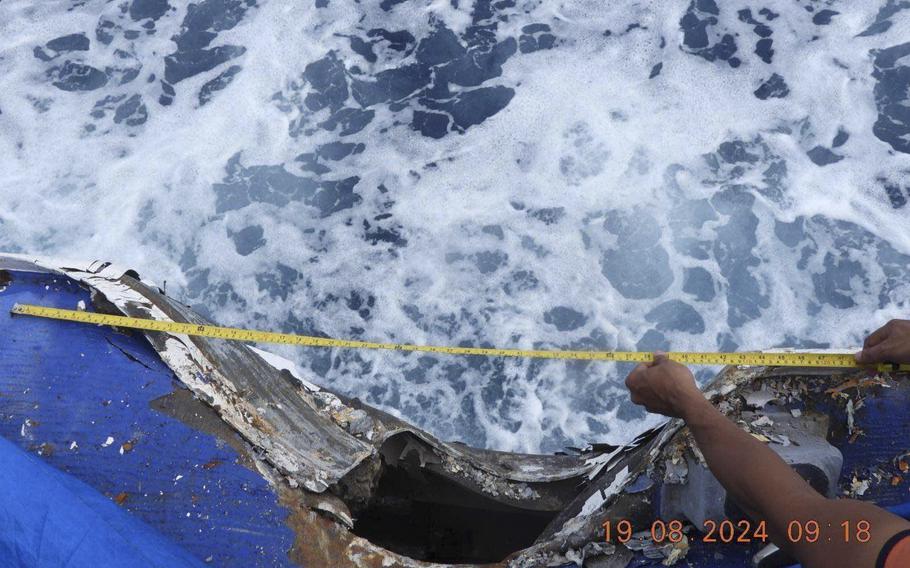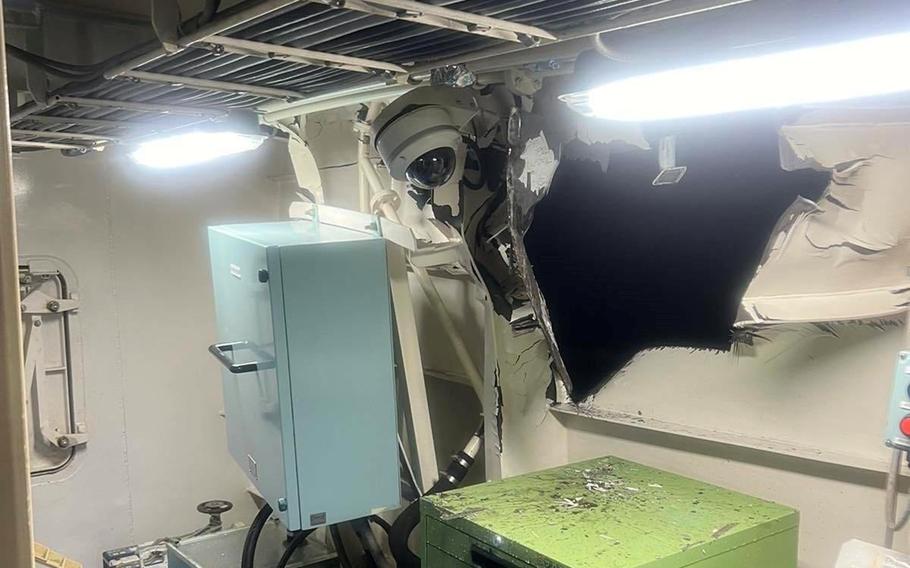
This photo provided by the Philippine coast guard, shows damage on the Philippines coast guard vessel BRP Cape Engano after a collision with a Chinese coast guard ship Monday, Aug. 19, 2024 in the disputed South China Sea. (AP)
Philippine and Chinese coast guard ships collided Monday in the South China Sea, with each government blaming the other for the incidents that raised tension in the disputed territory.
The collisions happened when a pair of Philippine ships — BRP Cape Engano and BRP Bacagay — encountered a China coast guard vessel near Sabina Shoal, according to a statement that day from Jonathan Malaya, spokesman for the Philippines’ National Security Council.
The shoal, in the Spratly Islands, known in China as the Nansha Islands, is about 87 miles west of the Philippine province of Palawan. In May, Manila accused Beiing of attempting to reclaim land at the shoal, which is claimed by both countries, as well as Taiwan and Vietnam.
The Cape Engano was “subjected to aggressive maneuvers” by a Chinese ship shortly before 3:30 a.m., Malaya said in the statement.
“This resulted in a collision with the starboard beam of the vessel, creating a hole on the deck with an approximate diameter of five inches,” he said.
At 3:40 a.m., the Chinese rammed the BRP Bacagay twice, also causing damage, Malaya said.
However, Chinese coast guard spokesman Gan Yu, in comments posted on the service’s website that day, said the Philippine ships ignored a warning and “deliberately collided” with the Chinese vessel.
“The responsibility lies entirely with the Philippines,” Yu said. “We warn the Philippines to immediately stop its infringement and provocation, otherwise all the consequences arising from this will be borne by the Philippines.”

Two Philippine coast guard vessels were damaged in collisions with Chinese coast guard ships in the South China Sea, Monday, Aug. 19, 2024. (Philippine coast guard)
The United States stands with the Philippines “in condemning the China Coast Guard’s dangerous maneuvers near Sabina Shoal that endangered lives and caused damage to two @CoastGuardPH vessels,” U.S. Ambassador to the Philippines MaryKay Carlson posted on X on Monday afternoon.
“We are committed to supporting the rights of our #FriendsPartnersAllies under international law,” she wrote.
In April, a China coast guard ship with water cannons damaged one of two Philippine coast guard vessels at Scarborough Shoal, inside the Philippines’ exclusive economic zone but controlled by Beijing.
An escalating number of similar encounters have occurred between the two countries at Second Thomas Shoal, a reef exposed at low tide inside the Philippine exclusive economic zone in the South China Sea.
The Chinese coast guard has interrupted Filipino navy and coast guard efforts to resupply troops on the grounded BRP Sierra Madre. The rusted warship houses a garrison to reinforce the Philippines’ claim to the shoal.
Last month, the commander of Marine Rotation Force - Darwin in northern Australia said U.S. Marines were ready to back up the Philippines in clashes with China over the shoal.
“We were given a warning order to support the Philippines’ defense forces in resupplying of the Second Thomas Shoal,” Col. Brian Mulvihill told Stars and Stripes on July 24.
Beijing and Manila agreed last month to deescalate at the shoal without conceding either side’s territorial claims.
If there are no injuries resulting from the latest clash it’s likely both sides will seek to deescalate, Paul Buchanan, a U.S. security expert based in New Zealand, said by email Monday.
“The U.S. is unlikely to get involved at this point beyond statements of concern or condemnation,” he said. “All parties will prefer to defuse rather than escalate.”
The U.S. hasn’t yet responded in a meaningful way to the South China Sea clashes, said Grant Newsham, a retired Marine colonel and senior researcher with the Japan Forum for Strategic Studies in Tokyo.
“The Filipinos are trying their best but don’t have the punch or resources to take on the Chinese alone,” he said by email Monday.
Stars and Stripes reporter Alex Wilson contributed to this report.